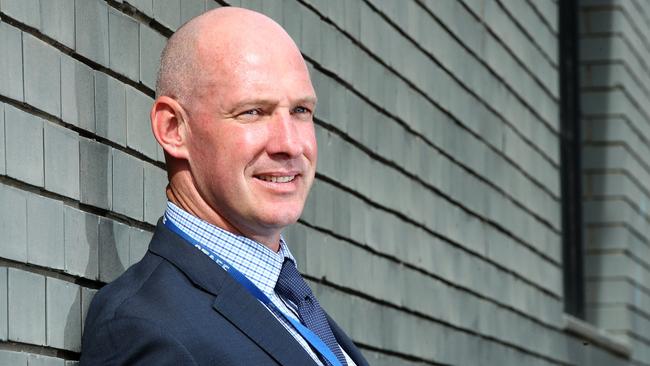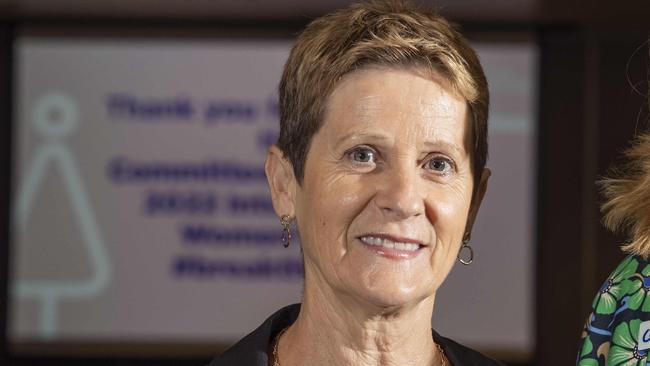Women and Children failed, as family violence torments the region
With statistics showing a dire need for protection for Geelong women and children, local experts have given insights into why there’s “significant backlog” in courts.
Geelong
Don't miss out on the headlines from Geelong. Followed categories will be added to My News.
In a time where more women and children are leaning on services to flee from violence, we are seeing more breaches in the very intervention orders designed to protect them.
But it is preventable.
Between 2016 to 2019, Victorian Magistrates heard 6,157 cases where offenders had persistently contravened a family violence safety notice or intervention order.
38 per cent were imprisoned, 27.7 per cent received a Community Corrections Order and 16.1 per cent were dismissed, according to Sentencing Council Victoria.
Of those imprisoned, 42 per cent remained behind bars for three months or less.
Data from the Crime Statistics Agency revealed in the year ending in May 2021, 1 in 5 criminal offences across the state were family violence related.

While overall criminal offending decreased over this time period, family violence related offending increased by 11.3 per cent to 112,432, which was driven by over 53,000 breaches in family intervention orders.
CSA Chief Statistician Fiona Dowsley said family violence related offending had been increasing over the last three years, “reflecting more than pandemic-related impacts”.
When it came to the 16,649 cases of contravening a family violence order heard by a Victorian Magistrate, less than 25 per cent were imprisoned and more than 45 per cent of them served three or less months.
Where there was an intent to cause serious harm or fear just over 50 per cent faced imprisonment, serving again three months or less.
Bryanna Connell, chief executive officer at Barwon Community Legal, said last financial year 61 per cent of clients were impacted by family violence, a 10 per cent increase from the year prior.
“There is a significant backlog at the court,” she said.
“Data shows listings for Family Intervention Orders at the Geelong’s Magistrates Court had increased by 38 per cent. It is the highest in the state.”
Ms Connell said a family violence case can be brought before the court in a civil matter, often with no police involvement.
“The victim survivor will apply for the order, which is different than if Victoria Police were called out to an incident where they may or may not charge the perpetrator,” she said.
“The applicant needs to prove that there has been an incident that in some way made them fearful for their safety, and there needs to be an ongoing fear that it may happen again.
“It is difficult to prove this through a witness or physical evidence given it generally occurs in private, so there is a fairly low threshold. The court makes the decision on the balance of probabilities rather than the reasonable doubt required in criminal matters.”
She said family violence did not just involve physical violence, but also financial or emotional abuse, property damage and coercion.
Geelong Family Violence Investigation Unit’s Senior Sergeant Nick Uebergang said police were working daily to protect vulnerable families.
“Teams of family violence detectives and uniform officers are knocking on the doors of known family violence offenders on a daily basis, putting them on notice,” he said.
“If they are caught offending or breaching a family violence order, police will have absolutely no hesitation in bringing them before a court.”
In Geelong the Family Violence Investigation Unit is located at the Barwon Multidisciplinary Centre (MDC) in Spring Street, Geelong West which houses a number of support services for victim survivors to access away from the police station.
“Time is critical in any investigation, but particularly in the case of family violence because our priority is to ensure the victim is safe from harm,” he said.
“Family violence orders are an extremely useful tool, as they give police the power to turn up unannounced on the doorsteps of known offenders and immediately apprehend them if they are in breach of that order, which could be as simple as being in a place they shouldn’t be.
“This ultimately mitigates more serious offending.”
Manger for case management and housing Bec Wilkin works out of the MDC, offering support and pathways for women and children fleeing violence as part of her role with the Sexual Assault Family Violence (SAFV) Centre.
“The past few years has seen an increase in demand for case management support, highlighting the increase and exacerbation in violence within our community,” she said.
“As of January, we have already achieved our annual target for family violence case management support and family violence therapeutic support.
“Despite the increase in demand, we are not seeing an increase in funding for specialist family violence case management services.”
Since July 2021, Ms Wilkin said 48 per cent of women seeking support from the SAFV Centre were at higher risk, serious risk or serious risk requiring immediate protection.
In her role, Ms Wilkin performs a variety of tasks such as family violence risk assessments and safety planning, as well as working with clients in achieving agreed goals, whether that be to access funding to increase their safety at home, or to help them relocate.
She also works with clients to help link them with their local community, to access support, housing, education or employment.
“One of the biggest challenges is accessing safe and suitable accommodation locally for women and children who leave their homes due to safety,” she said.
“Perpetrators who repeatedly breach IVOs also create a significant challenge, impacting women and children in their safety and recovery.”
She said clients often expressed frustration at offenders who breached orders repeatedly, calling it “exhausting.”
Others were concerned over the repercussions that reporting family violence may have on them and their children.

SAFV Centre’s chief executive officer Helen Bolton said there is “no indication” that the demand for support will slow down.
“Since July 2021, children and young people represented 41 per cent of the clients we supported for family violence case management, with the highest percentage being children aged between 0-11 which accounted for 30 per cent,” she said.
“In the last two months, we have seen a particularly high number of new clients being referred to our organisation.”
Ms Bolton said limited crisis accommodation and long-term housing in the Barwon region has been a contributing factor for women and children staying in unsafe relationships.
“Family Violence is a serious and widespread problem, but it is preventable,” she said.
“We need long-term and secure funding that truly reflects the level of need in the community for family violence and we know this need continues to grow.
“While we have a vast range of support services in our community to respond and support, it will take a shift in our attitudes towards women and working towards gender equality that will ultimately end violence against women.
“We need commitment from families, workplaces and organisations to help create a community where women are safe, equal and valued and take active steps to promote and normalise gender equality and challenge sexism and discrimination because the impact of violence against women not only impacts women, but all of our society.”
More Coverage
Originally published as Women and Children failed, as family violence torments the region




